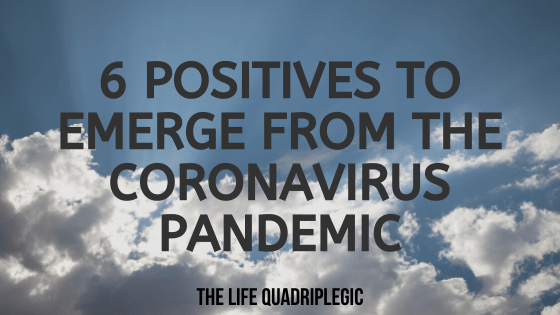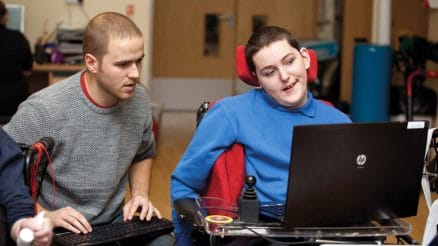Last Updated on 28/06/2020 by Alex Squire
The novel coronavirus has changed life a lot since it started its tour around the globe. There’s a lot of suffering and misery, but there are also some silver linings.
In this post, I’m going to list 6 positive things that have come out of this pandemic.
Lower Air Pollution

After the lockdown, many cities all over the world have experienced lower levels of air pollution. City streets have been quieter without the traffic, and apparently, people can hear birds singing in London, which is usually a rarity. This is something most pronounced in places like India and China where the skies are typically thick with smog. But lockdown has shown people what the world could be like if pollution is controlled more.
Do we really want to go back to cities filled with exhaust fumes and noise? I don’t. It remains to be seen whether the world will become more environmentally friendly after this but I hope it will.
More people working from home

Everyone who can work from home has been told to do so. Many companies who previously thought that this was not possible have suddenly discovered that it is. It’s not only possible, but it can even be better than before.
Working from home has particular benefits for disabled people because we don’t have to deal with all the logistical problems of getting to the workplace.
If working from home becomes a normal thing to do in society then I think that would be good for everyone, not just disabled people. It would also decrease congestion because fewer people would have to travel and even lower air pollution as a result.
A greater sense of community spirit

Thousands of local community groups have sprung up around the country full of people who are volunteering to help those in need. Things like doing their shopping for them or phoning people up to give them someone to talk to. It seems like a lot of people are eager to help vulnerable people. You can use this website to find your local support group.
Hopefully, this will carry on once the pandemic has ended. Loneliness was a problem for some people even before the pandemic, so if these kinds of community support groups can carry on to help vulnerable people to stay connected with their community, then that is a good thing.
750,000 people signed up as NHS volunteers which is an incredible number considering they were only initially looking for 250,000. People have been singing from their balconies to try and keep spirits up, or police have been dancing in the streets. It’s heartening to see.
Appreciation of key workers

This pandemic has really shown how valuable some people are to society. Some people doing low-paid jobs like delivery drivers, care workers, and supermarket cashiers are now key workers whereas before we probably all took them for granted. They are literally keeping the economy ticking over.
I hope that when all this is over, society doesn’t forget how we relied on them. I hope that their value is reflected by higher pay, especially for NHS workers.
Here’s a petition to increase NHS workers pay.
Covid 19 has highlighted that when the shit hits the fan, we still need people to do so-called “low skilled” jobs like caring for vulnerable people or picking up the rubbish.
The banning of livestock markets and wildlife trade

Early on in the pandemic, China banned the trade and consumption of wild animals. This meant closing wet markets like the one in Wuhan where the virus is thought to have originated. It’s in places like these where large numbers of live animals and humans are in close contact with each other that viruses can arise and jump into humans.
The world needs to shut down the trade in live animals and do something about factory farms. Industrial farming also provides an excellent environment for viruses to arise in livestock and then jump into humans, as happened in the swine flu pandemic.
I hope that the world will recognise the dangers of our ways and change before it happens again. This is especially important because climate change will probably increase the risk from deadly diseases.
We can learn from this pandemic

As bad as Covid 19 is, it could be a lot worse. Just look at the 1918 Spanish flu pandemic which killed 50 million people, and infected 1/3 of the world’s population. So far it looks like SARS nCoV-2 is nowhere near as deadly as the Spanish flu, but it has still caused massive problems.
Covid 19 should be a big wake-up call for all of us.
This is a good opportunity for the world to learn how to deal better with pandemics so that when a really deadly one does arise in the future (and it probably will do), we will be battle-hardened. The response of some governments like the UK and the US has been pretty lacklustre, so we are lucky that the virus has not been more deadly. Politicians say that there was no precedent for a pandemic like this. I call bullshit.
Pandemics have happened over and over again throughout history so we knew something like this was a possibility. It’s just our noble leaders never heeded the warnings. After this, no one can use the “unprecedented” excuse anymore, so there will be no excuse to be unprepared for the next one. I really do hope that the world learns the lessons from this, and I’m hopeful that we will do once it’s over and the post-mortem begins.






A brilliant read Alex…… Well said to all the above…. Stay well….(Hugs)
Thanks Kaz, Hope you stay safe too
Totally agree. It is much easier to ride around on my mobility scooter without crazy traffic. Oh, I had the chance to visit London for the first time. So easy to get around with a wheelchair (scooter broke the day before the trip). Got to see where Anne lost her head, always a dream of mine to see it. The Tate Modern even has a mobility scooter for free to use. The trains were great and very accessible (and kind). Love your city.